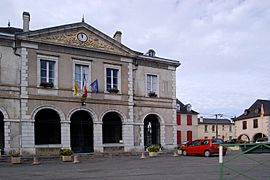Bruges-Capbis-Mifaget facts for kids
Quick facts for kids
Bruges-Capbis-Mifaget
|
||
|---|---|---|
 |
||
|
||
| Country | France | |
| Region | Nouvelle-Aquitaine | |
| Department | Pyrénées-Atlantiques | |
| Arrondissement | Pau | |
| Canton | Ouzom, Gave et Rives du Neez | |
| Intercommunality | Vath Vielha | |
| Area
1
|
16.55 km2 (6.39 sq mi) | |
| Population
(Jan. 2019)
|
870 | |
| • Density | 52.6/km2 (136.2/sq mi) | |
| Time zone | UTC+01:00 (CET) | |
| • Summer (DST) | UTC+02:00 (CEST) | |
| INSEE/Postal code |
64148 /64800
|
|
| Elevation | 277–473 m (909–1,552 ft) (avg. 316 m or 1,037 ft) |
|
| 1 French Land Register data, which excludes lakes, ponds, glaciers > 1 km2 (0.386 sq mi or 247 acres) and river estuaries. | ||
Bruges-Capbis-Mifaget is a small town, also known as a commune, located in the southwestern part of France. It is found in the Pyrénées-Atlantiques département, which is like a county or administrative area. This charming place is known for its peaceful setting and connection to the beautiful Pyrenees mountains.
Contents
About Bruges-Capbis-Mifaget
Where is Bruges-Capbis-Mifaget?
This commune is situated in the Pyrénées-Atlantiques area of France. It's in the region of Nouvelle-Aquitaine. The town is nestled in a lovely natural setting. It is close to the famous Pyrenees mountains, which form a natural border between France and Spain.
What is a Commune?
In France, a commune is the smallest administrative area. It's like a local town or village. Each commune has its own local government. This government helps manage things like local services and community life.
Who Lives There?
As of January 2019, Bruges-Capbis-Mifaget had about 870 people living there. This makes it a small community. People living in communes often enjoy a close-knit community feeling.
How is it Governed?
Like all communes in France, Bruges-Capbis-Mifaget has a mayor. The mayor is the head of the local government. The current mayor is François Lescloupé. He was elected to serve from 2016 to 2020. The mayor and the local council work together to make decisions for the commune. They help manage daily life and plan for the future of the town.
See also
 In Spanish: Bruges-Capbis-Mifaget para niños
In Spanish: Bruges-Capbis-Mifaget para niños
 | George Robert Carruthers |
 | Patricia Bath |
 | Jan Ernst Matzeliger |
 | Alexander Miles |




